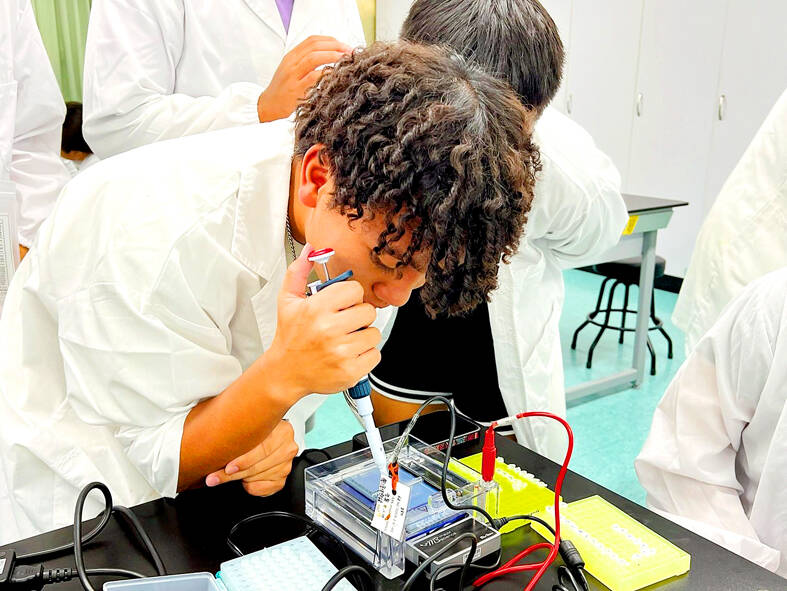New Taipei City Consumer Protection Office Director Wang Chih-yu (王治宇) urged parents to check contract content and institutional operations before sending children to cram schools, enrichment classes or day care centers during summer vacation.
Closures and refund problems most commonly occur in cram schools, especially language cram schools, many of which have been facing difficulties due to the popularity of online learning apps and studying abroad, Wang said.
Cram schools that closed due to financial issues were often unable to refund tuition fees, he said.

Photo courtesy of the Ministry of Education
Under Article 24 of the Rules for the Establishment and Management of Short-term Supplementary Learning Centers (短期補習班設立及管理準則), cram school operators may refuse to refund tuition fees if the student does not apply for a refund before completing one-third of the course or of the total program hours, he said.
Some cram schools offer plans with higher fees at the beginning, with lower prices later, or suggest buying a short-term course to get a long-term program for free, which are tactics to cut down on potential refunds or the amount refunded, Wang said.
Parents must carefully evaluate such offers and fully understand the refund rules, he said, adding that short-term programs and monthly tuition plans are preferable.
Although day care centers essentially provide childcare services and are less at risk of being replaced by online learning or digital learning tools than cram schools, their operations have become less stable amid falling birthrates, Wang said.
Although the demand for day care centers spikes during the summer, it can plunge once school starts, he said.
Many enrichment classes, such as mental arithmetic or dance courses, are provided at personal studios, small tutoring classrooms with less than five students, or non-fixed locations, and are therefore unregulated, he said.
Given that most enrichment classes are designed for younger children, parents should carefully review contract content and inspect the learning environment, he said.
Hsia Chih-chiang (夏治強), the head of the social education division of the New Taipei City Department of Education, said that consumer complaints with cram schools are handled in accordance with regulations.
For example, a cram school granted parents in the city’s Linkou District (林口) a refund even though their child attended for five months, given the family’s situation, Hsia said.
Another student received a reasonable refund from a cram school in Banciao District (板橋) after dropping the program due to a change in academic pursuits, he said.
The department would continue to enhance the review of cram school registrations and teacher qualifications, as well as to investigate contraventions and promote consumer rights, he said, urging operators to increase quality and transparency.
People who encounter consumer disputes can call the 1999 hotline or file a complaint with their local education departments, he said.

Taiwan has received more than US$70 million in royalties as of the end of last year from developing the F-16V jet as countries worldwide purchase or upgrade to this popular model, government and military officials said on Saturday. Taiwan funded the development of the F-16V jet and ended up the sole investor as other countries withdrew from the program. Now the F-16V is increasingly popular and countries must pay Taiwan a percentage in royalties when they purchase new F-16V aircraft or upgrade older F-16 models. The next five years are expected to be the peak for these royalties, with Taiwan potentially earning

STAY IN YOUR LANE: As the US and Israel attack Iran, the ministry has warned China not to overstep by including Taiwanese citizens in its evacuation orders The Ministry of Foreign Affairs (MOFA) yesterday rebuked a statement by China’s embassy in Israel that it would evacuate Taiwanese holders of Chinese travel documents from Israel amid the latter’s escalating conflict with Iran. Tensions have risen across the Middle East in the wake of US and Israeli airstrikes on Iran beginning Saturday. China subsequently issued an evacuation notice for its citizens. In a news release, the Chinese embassy in Israel said holders of “Taiwan compatriot permits (台胞證)” issued to Taiwanese nationals by Chinese authorities for travel to China — could register for evacuation to Egypt. In Taipei, the ministry yesterday said Taiwan

Taiwan is awaiting official notification from the US regarding the status of the Agreement on Reciprocal Trade (ART) after the US Supreme Court ruled US President Donald Trump's global tariffs unconstitutional. Speaking to reporters before a legislative hearing today, Premier Cho Jung-tai (卓榮泰) said that Taiwan's negotiation team remains focused on ensuring that the bilateral trade deal remains intact despite the legal challenge to Trump's tariff policy. "The US has pledged to notify its trade partners once the subsequent administrative and legal processes are finalized, and that certainly includes Taiwan," Cho said when asked about opposition parties’ doubts that the ART was

If China chose to invade Taiwan tomorrow, it would only have to sever three undersea fiber-optic cable clusters to cause a data blackout, Jason Hsu (許毓仁), a senior fellow at the Hudson Institute and former Chinese Nationalist Party (KMT) legislator, told a US security panel yesterday. In a Taiwan contingency, cable disruption would be one of the earliest preinvasion actions and the signal that escalation had begun, he said, adding that Taiwan’s current cable repair capabilities are insufficient. The US-China Economic and Security Review Commission (USCC) yesterday held a hearing on US-China Competition Under the Sea, with Hsu speaking on